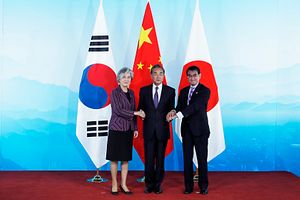The announcement came in the same 30-day period that marked the most intense bout of North Korean missile testing since 2017. For South Korea, however, the decision was about sending a message. Anti-Japanese sentiment in Korea spiked after Tokyo’s decision earlier this summer to impose export controls on Seoul.
Japan’s decision was borne of a general animus about what was seen in Tokyo as the current South Korean progressive government’s lack of willingness to adhere to past agreements between the two countries. The fig leaf for Japan’s action was concern that South Korea was improperly handling certain sensitive chemicals.
What we are witnessing today in northeast Asia is the possible origin of a new reality where South Korea and Japan begin to openly see each as adversaries.
That’s a strong word, but it describes the current spiral of cost-imposition measures by each side on the other. They’re not quite enemies, but they’re certainly not friends.
The origins of the current dispute date back further: certainly to the 2015 agreement – concluded furtively by the previous conservative government in South Korea and the Japanese government – on the status of Korean women that had been forced into sexual slavery during the second world war by the Imperial Japanese Army.
South Korean progressives – now in power – and civil society rejected that agreement, which was at the time presented as “final and irreversible”.
But the end of GSOMIA shows that the dispute has thoroughly spilled into the realm of security affairs. Nothing – not mutual concerns about North Korea, certainly – is serving as a crash barrier on the contours of the dispute.
Without the agreement, both Seoul and Tokyo will have to rely primarily on the U.S. for intelligence about North Korea and other issues beyond their own indigenous capabilities. The arrangement also allowed them to share classified information directly, which they will no longer be able to do.
Washington, meanwhile, is loath to take sides between its two allies: the cost of the Trump administration’s lack of investment in trilateral cooperation in northeast Asia has come due.
The information agreement between South Korea and Japan wasn’t a revolution. Instead, it was a modest building block for a brighter trilateral future. The deal, which is largely generic, simply set up operating procedures for how each country would share its own classified military information with the other and how it would handle such data received from the other. It did not require any particular action from Seoul towards Tokyo or vice versa.
A beneficiary of the apparent collapse of GSOMIA is China, which not only regards U.S. alliances in northeast Asia as a major source of asymmetric advantage for Washington, but has recently seen efforts by the United States to network its discrete “hub-and-spoke” alliances to yield something greater than the sum of their parts.
For the Trump administration, the end of GSOMIA between its two most important East Asian allies will be a setback to the vision laid out in the 2017 National Security Strategy and 2018 National Defence Strategy – strategic documents that had underscored the central role of strong alliances in “great power competition”.
For President Donald Trump himself, however, the ongoing difficulties between Seoul and Tokyo are likely to serve as yet another reminder of why allies aren’t worth the trouble they seem. Trump, already prone to seeing alliance as costly “bad deals”, is unlikely to take an interest in repairing the foundations for U.S. trilateralism.
Beijing may have a golden opportunity in the meantime. Both South Korea and Japan are thinking about their respective long-term relationships with an increasingly assertive China and neither has chosen to fully alienate Beijing, maintaining open channels of engagement.
While the Seoul-Beijing relationship was strained over a 2016-17 dispute over missile defence and the Tokyo-Beijing relationship over the status of disputed islands in the East China Sea, China might find that as South Korea and Japan drift apart, it can step in to make the most of the situation.
This article first appeared in the South China Morning Post. It is republished here with kind permission.

































